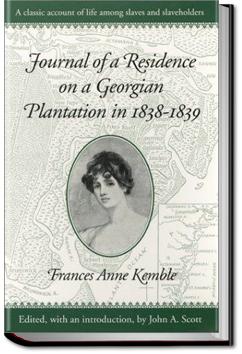UNLIMITED Audiobooks and eBooks
Over 40,000 books & works on all major devices
Get ALL YOU CAN for FREE for 30 days!
Journal of a Residence on a Georgian Plantation
Fanny Kemble
Book Overview:
Fanny Kemble was a British actress who married mega-plantation owner, Pierce Butler of Georgia. During her marriage she kept journals of everyday life, and after some years grew to detest the institution of slavery and the things Butler stood for. Kemble eventually divorced him, but it wasn't until after the Civil War had started that she published her journal about her observations and the experiences of the hundreds of African American slaves owned by her ex-husband.
Fanny Kemble was a British actress who married mega-plantation owner, Pierce Butler of Georgia. During her marriage she kept journals of everyday life, and after some years grew to detest the institution of slavery and the things Butler stood for. Kemble eventually divorced him, but it wasn't until after the Civil War had started that she published her journal about her observations and the experiences of the hundreds of African American slaves owned by her ex-husband.
How does All You Can Books work?
All You Can Books gives you UNLIMITED access to over 40,000 Audiobooks, eBooks, and Foreign Language courses. Download as many audiobooks, ebooks, language audio courses, and language e-workbooks as you want during the FREE trial and it's all yours to keep even if you cancel during the FREE trial. The service works on any major device including computers, smartphones, music players, e-readers, and tablets. You can try the service for FREE for 30 days then it's just $19.99 per month after that. So for the price everyone else charges for just 1 book, we offer you UNLIMITED audio books, e-books and language courses to download and enjoy as you please. No restrictions.
Try now for FREE!

"Love your service - thanks so much for what you do!"
- Customer Cathryn Mazer
"I did not realize that you would have so many audio books I would enjoy"
- Customer Sharon Morrison
"For all my fellow Audio Book & E-Book regulars:
This is about as close to nirvana as I have found!"
- Twitter post from @bobbyekat



Community Reviews
After having read this, my father-in-law took it up on a visit. He wasn't finished when it was his time to leave so I gave it to him. When I started rebuilding my library I decided I had to purchase it again. I never really fully understood the horrors of slavery until I read this book. Frances Anne
The journal that Frances Anne “Fanny” Kemble kept, during her months of residence at her husband’s plantation in coastal Georgia in 1838 and 1839, provides a powerful and wrenching look at the institution of slavery in the Deep South during the antebellum era. Kemble’s gift for observation and her e
Frances Anne Kemble’s ‘Journal of a Residence on a Georgian Plantation (1838-1839) is one of the most remarkable primary-source first-person narratives of slavery that I’ve read. This is not the least because she had no crusade as she did not publish her diary, as I read, until 1863 although her mem
Francis Anne Kemble was born and raised in England. She became an actress and eventually traveled to America performing. While there she met and eventuallly married Pierce Butler. Butler and Fanny lived in the North, but their money came from Butler's rice plantation in the South.
When Fanny made one
This is one of those books that I'm glad I read, but was glad to be finished with. Before I read it, I knew that Kemble was a British actress who spent a winter on a Georgia plantation before the Civil War, but I didn't know the whole story, which was only slowly revealed in the text. (A little web
A unique and meticulous account of life on a southern plantation during the Antebellum period, Journal of a Residence on A Georgian Plantation in 1838-1839 is a must read for anyone wishing to gain a broader understanding of life in the American slave system.
Having acquired great renown as an accom
A book everyone in America should read, not for style but for content. It gives priceless insight into the life of both slave and slave holder from the eyes of an English woman who married into a slaveholding family. Difficult to read at times due to subject matter but essential nonetheless.
Important reading.
How on earth could the slave owners and overseers not realize that in listening to the complaints of the slaves, this woman was actually doing the owners themselves a favor -rather than increasing discontent, listening gave an outlet to those slaves who confided in her, thus actu